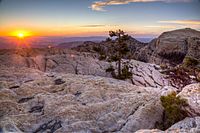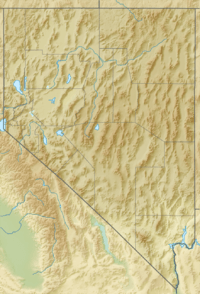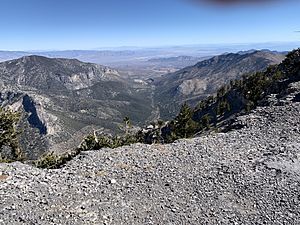Spring Mountains facts for kids
Quick facts for kids Spring Mountains |
|
|---|---|

|
|
| Highest point | |
| Geography | |
The Spring Mountains are a cool mountain range in Southern Nevada, United States. They stretch from northwest to southeast, just west of Las Vegas. They even reach down to the California border. Most of this land is looked after by the United States Forest Service and the Bureau of Land Management. These groups manage the area as the Spring Mountains National Recreation Area. This recreation area is part of the larger Humboldt-Toiyabe National Forest and the beautiful Red Rock Canyon National Conservation Area.
Contents
Exploring the Spring Mountains' Geography
The Spring Mountains got their name because of the many natural springs found there. Many of these springs are hidden in the amazing Red Rock Canyon National Conservation Area. This area is located on the eastern side of the mountains.
The Spring Mountains act like a natural wall. They separate the Pahrump Valley and Amargosa River areas from the Las Vegas Valley. Water from the Las Vegas Valley flows into the Colorado River through Las Vegas Wash and then into Lake Mead. This means the mountains help form part of the edge of the Great Basin. The Great Basin Divide, which is a border of the Great Basin region, continues north. It goes through the Indian Springs Pass area. Then, it turns east around the mountains north of Las Vegas.
Discovering Mount Charleston
The highest point in the Spring Mountains is Mount Charleston. It is also officially known as Charleston Peak. This peak stands tall at about 11,918 feet (3,633 meters). The area around Mount Charleston is protected as the Mount Charleston Wilderness. This helps keep its natural beauty safe.
The main town in this area is also called Mount Charleston. It is located in Kyle Canyon. The weather here is usually 30 to 40 degrees Fahrenheit (17 to 22 degrees Celsius) cooler than in the valleys below. This makes it a very popular place for people from Las Vegas to visit. They come to escape the heat and enjoy nature. The Lee Canyon (Ski and Snowboard Resort) is a fun place for skiing and snowboarding. It is found in Lee Canyon along State Highway 156.
Other Important Peaks
Besides Mount Charleston, there are several other big mountains in the Spring Mountains range. These include:
- Bonanza Peak
- McFarland Peak
- Mummy Mountain
- Griffith Peak
- Bridge Mountain
- Mount Wilson
- Mount Potosi
Amazing Plants and Animals
The Spring Mountains are like a "sky island" ecosystem. This means they are a high, cool, and wet area surrounded by a very different, drier environment. The mountains cover about 860 square miles (2,227 square kilometers). They also have a huge height difference of almost 2 miles (3.2 kilometers).
This wide range of conditions creates many different habitats. Because of this, the variety of life here is probably greater than anywhere else in Nevada. For example, 37 different types of trees grow here. That is more than any other mountain range in Nevada! Also, over 600 types of vascular plants have been found in the Red Rock Canyon National Conservation Area alone.
Plant Life Zones
The plants in the Spring Mountains change as you go higher up.
- Lower areas: The bases of the mountains are part of the Mojave Desert zone. Here, you will mostly see creosote bush and white bursage.
- Middle areas: As you climb higher, you enter a blackbush scrub zone. After that, there is a pygmy conifer zone. This area has smaller trees like juniper, pinyon pine, and mountain mahogany.
- Highest areas: The very top parts are a montane zone. Around Mount Charleston and its connecting ridges, you will find many kinds of tall conifer trees.
Unique Animals
One special animal that lives only in the Spring Mountains is Palmer's chipmunk. This small, striped rodent is endemic to this area. This means it is found nowhere else in the world!
Images for kids
-
Mount Charleston in the Spring Mountains, Nevada
-
A Populus fremontii tree in the Spring Mountains
See also
 In Spanish: Spring Mountains para niños
In Spanish: Spring Mountains para niños
 | Delilah Pierce |
 | Gordon Parks |
 | Augusta Savage |
 | Charles Ethan Porter |







